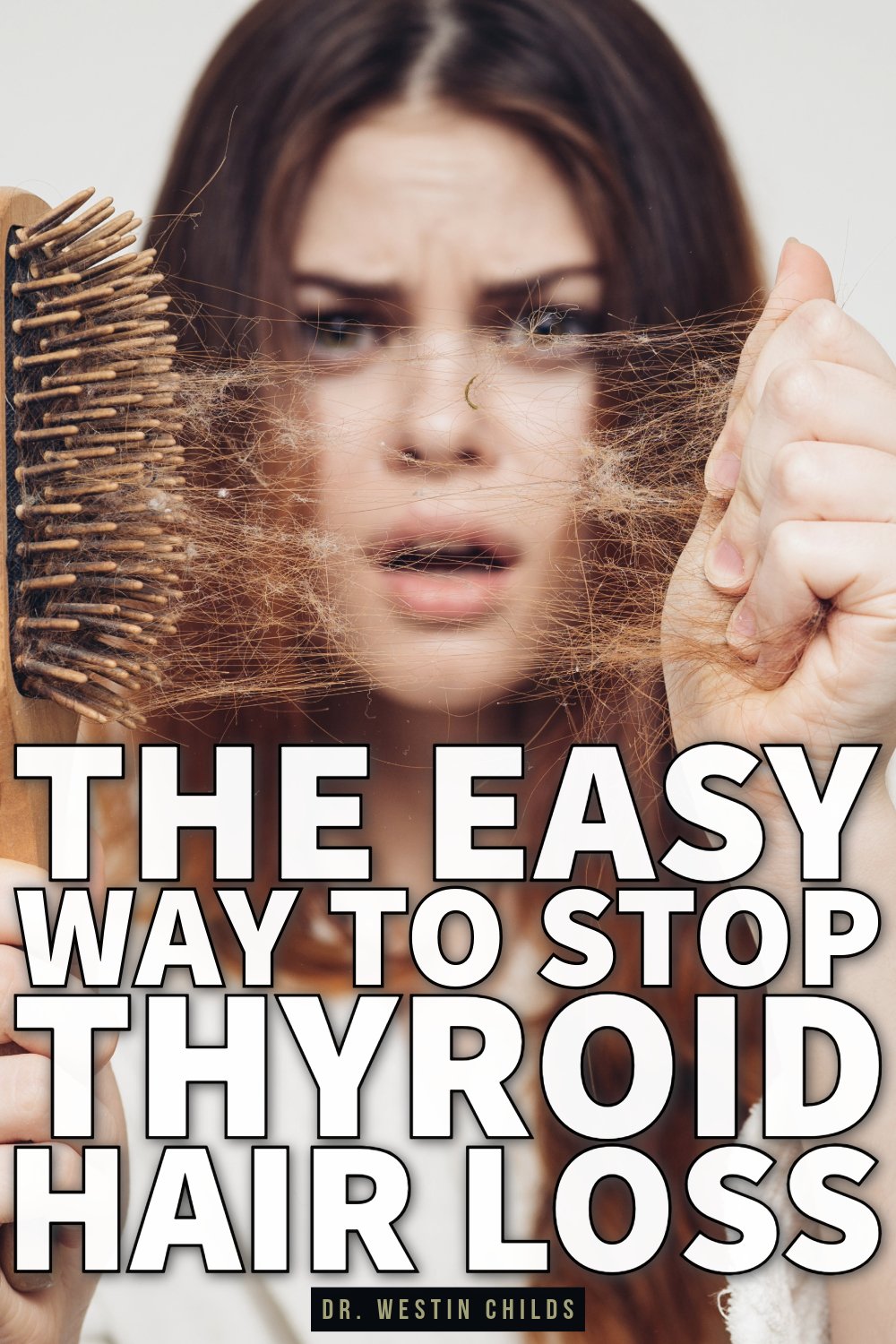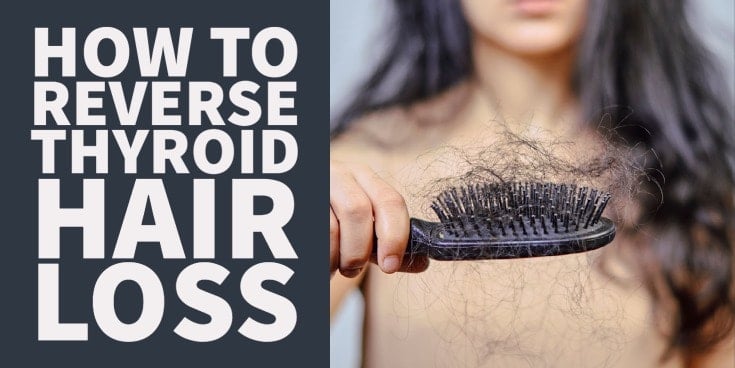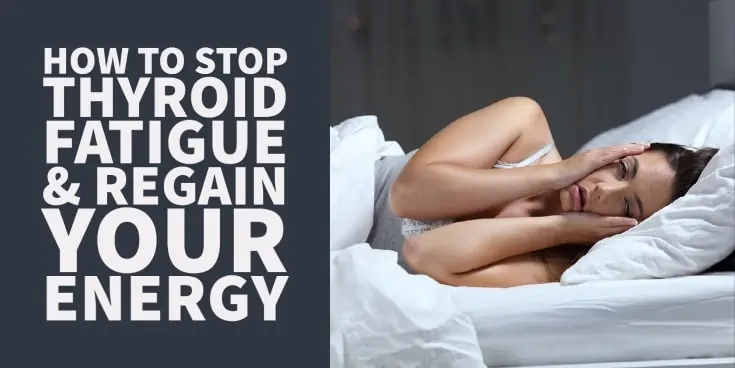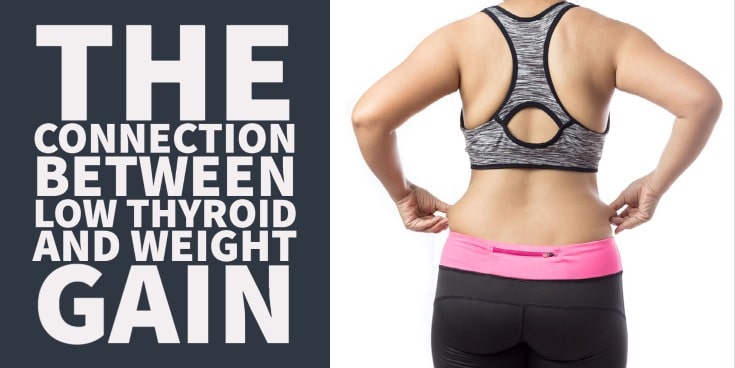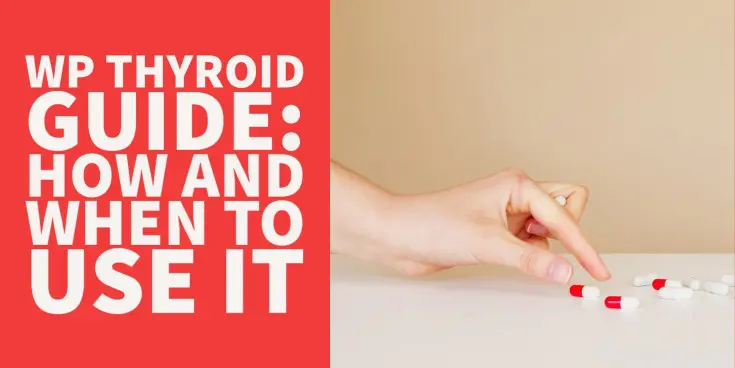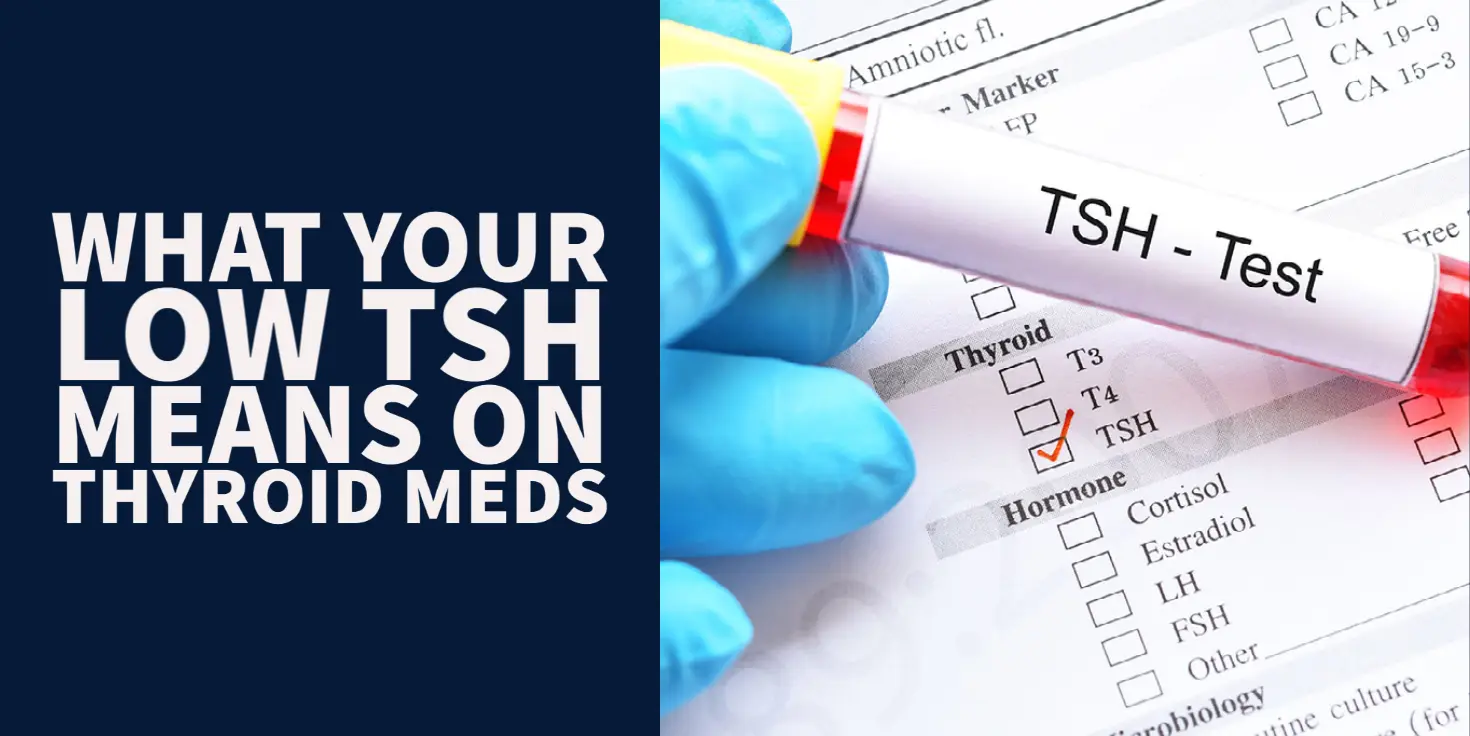Have you noticed clumps of hair in the drain when you shower?
Is your hair dry, brittle, or breaking?
Or have you noticed a thinning of your eyebrows?
All of these symptoms can be caused by thyroid dysfunction. And they aren’t uncommon either with around 40% of patients experiencing them.
And if that’s your issue, you’re in the right place because thyroid-related hair loss is a solvable problem.
Here’s my 7-step process for fixing it:
Step #1. Check Thyroid Function
This is, by far, the most overlooked cause of hair loss for thyroid patients.
The reason?
Because thyroid dysfunction, both high and low, results in a type of hair loss known as telogen effluvium (1).
This is a diffuse type of hair loss that occurs across the entire head and it’s related to the impact thyroid hormone has on the hair follicle.
When thyroid hormone is too high or too low it will disrupt the hair follicle by delaying the growth phase and prolonging the shedding phase.
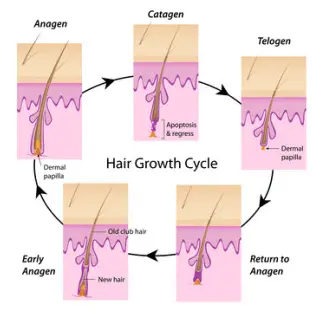
In other words, your hair grows more slowly while also shedding at a faster rate.
Over time this leads to thinning of the hair and a lot of distress.
To be clear, this isn’t the only cause of hair loss related to your thyroid, but it is the most common which is why it’s #1 here.
Fortunately, it has an easy solution:
Fix your thyroid!
It sounds so simple and yet it’s something that is overlooked by most doctors and most patients.
But if you can normalize thyroid function, you will solve this problem.
How do you do that?
The fastest way is through the use of thyroid medication and thyroid lab tests.
But standard medications and standard lab tests are usually not enough.
Instead, you will want to do the following:
First, get a comprehensive set of thyroid lab tests that includes TSH, free T3, and free T4, and make sure that these values are optimal, not just normal.
Second, use a combination of thyroid medications, including T4, T3, and T2.
Taking just levothyroxine by itself and looking only at the TSH isn’t going to cut it. And if I had to bet money, that’s probably the strategy that most of you are using right now which is why you’re still experiencing hair loss.
But when you take this comprehensive approach to thyroid management, you will probably find a significant improvement in hair quality and a reduction in hair loss to boot.
That’s step #1, step #2 is a little more complex:
Step #2. Take a Close Look At Your Thyroid Medication
This is where things might get a little confusing, but stick with me.
Here’s the reality of the situation for thyroid patients:
All thyroid medications have the potential to cause hair loss.
That doesn’t mean that they always will, but it does mean that they can.
This is for two reasons:
The first is that you may just be taking the wrong dose.
If your dose of thyroid medication isn’t high enough then you will remain hypothyroid and your medication will have no impact on your hair loss because it just isn’t working.
And conversely, if you take too much thyroid medication then you may push yourself into a hyperthyroid state which also can cause hair loss.
The bottom line is that if your thyroid medication is not in that Goldilocks zone, you may experience hair loss.
The second reason has more to do with the side effect profile of thyroid medications regardless of the dose being used.
Hair loss is a known side effect of all thyroid medications, including levothyroxine, in a similar way that you might experience nausea when taking metformin.
But let me be clear:
Not everyone who takes thyroid medication will experience this side effect.
But for those who do, it definitely throws a wrench in the whole figuring out why you have hair loss equation.
The good news here is that this problem can easily be solved by just switching to another type of thyroid medication.
If you are having issues with levothyroxine then try Synthroid or Tirosint.
If you are having issues with Cytomel then try liothyronine or SR T3.
If you are having issues with Armour Thyroid then try Adthyza or NP Thyroid.
There’s always another option and always another thyroid medication. The hard part is just getting your doctor to prescribe it.
To summarize:
Make sure your thyroid medication dose is in the Goldilocks optimal range and, if you are still experiencing hair loss, try another type of thyroid medication.
Step #3. Check Your Iron & Ferritin Status
By far, the most common nutrient deficiency behind hair loss in thyroid patients is iron.
What gets confusing is that the best way to test for this deficiency is by assessing a lab test known as ferritin, not iron.
Ferritin is a protein that stores iron and is used as a way to assess iron storage in the body.
This matters because it’s both possible and common for thyroid patients to have completely normal iron levels while also having low ferritin.
And it’s this decline in ferritin that impacts your hair.
In fact, when we look at the research, we see that a ferritin level of 70 ng/mL is necessary for optimal hair health (2).
But here’s the problem:

If you look at the reference range for ferritin, it ranges from 30 to 300 ng/mL.
This means you could have a low normal ferritin level of 45 ng/mL which is high enough to be “normal” but not high enough to support hair growth.
And I can’t tell you how many thyroid patients I’ve seen in this low normal range.
To make matters worse, doctors typically don’t check your ferritin unless you already have signs of anemia.
So you could be walking around with low ferritin without even realizing it.
And because of the impact that thyroid hormone has on iron absorption, up to 30% of hypothyroid patients don’t have enough.
It’s for these reasons that every thyroid patient should have both their ferritin and iron levels assessed (3), especially if they are having problems with hair loss.
If you find that your ferritin is less than 30 ng/mL, take iron supplements to get it up to at least 70 ng/mL.
Doing this will not only improve your hair health but also thyroid function and it’s a simple step to solving hair loss.
By the way, this ferritin issue is also why many women believe that prenatal multis help with hair growth.
There’s nothing magical about the prenatal vitamin except that it contains iron and iron is usually excluded from multis because you never want to take more than you need.
Step #4. Check For Hormone Imbalances
On top of thyroid hormone-related hair loss, you also need to worry about other hormone-related hair loss as well.
The one that stands out is androgenetic alopecia.
This type of hair loss is more common in men but an astounding 30 million women in the United States experience it as well (4).
And for someone with a thyroid problem, you are at higher risk for developing it.
In women, this type of hair loss presents as a thinning of the hair on the crown of the head and on the front of the scalp.
And it should be differentiated from the other types of hair loss we’ve discussed so far because the treatment is different.
This type of hair loss stems from the impact that certain androgens have on the hair follicle.
It’s thought that in thyroid patients, a lack of thyroid hormone weakens the hair follicle which makes it more susceptible to androgen influence.
The result is that hair follicles that are more sensitive to androgens will shrink over time.
And the follicles that are more sensitive tend to congregate in certain places like the crown and the hairline.
The good news is there are lots of different treatments that can help your body better breakdown and eliminate these androgens.
These range from natural options like zinc and saw palmetto to medications like spironolactone and minoxidil.
By the way, low estrogen and low progesterone, the female sex hormones, can also contribute to hair loss as well.
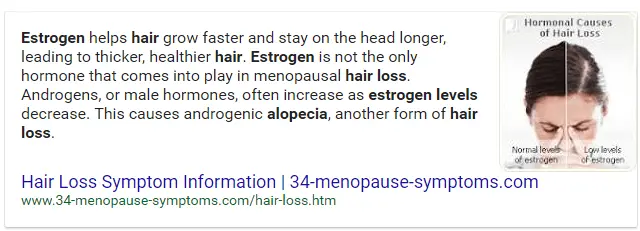
And these hormones also tend to be imbalanced as a result of thyroid dysfunction.
The good news is that by optimizing your thyroid as we talked about in step #1, you may not need to do any additional treatments.
So be aware of these other hormones, but focus on your thyroid first.
Step #5. Check For Immune Dysfunction
In addition to dealing with telogen effluvium and androgenetic alopecia, as a thyroid patient, you will also be more susceptible to another type of hair loss known as alopecia areata.
Unlike the other two, this one stems from immune dysfunction and is classified as an autoimmune disease.
Because the most common type of thyroid disease is an autoimmune disease; Hashimoto’s thyroiditis.
And because if you have one autoimmune disease you are much more likely to develop another, all thyroid patients should be aware of it.
Fortunately, this type of hair loss is easy to spot and not as common as the other two.
You’ll know if you have it because you’ll find areas of patchy hair loss, usually in circular arrangements on the scalp but it can also impact eyebrows and eyelashes as well.
The bad news is that alopecia areata is more difficult to treat.
The good news is that only about 10-20% of thyroid patients will experience it (5).
And the other good news is that the same treatments that help balance the immune system when treating Hashimoto’s will also help with this type of hair loss.
If all else fails, look to your immune system.
Step #6. Consider Other Therapies
Going the all-natural route can definitely help you regrow your hair, but, let’s face it, they take time.
And sometimes time is a luxury, especially when you are losing clumps of your hair.
For that reason, there may be a time and a place to step up your treatments and get more aggressive.
These treatments won’t manage the root cause of your hair loss, but they can work quickly to halt hair loss and help you regain your confidence while you wait for the natural options to kick in.
Here are a few that work:
- Red light therapy – Red light with a wavelength of 600 to 650 nm has been shown to improve scalp blood flow, and cellular health, and prevent shrinkage of hair follicles (6). The only downside is the cost, but if you can afford it, it’s definitely worth it. And you can combine it with the other treatments we are about to mention for even better results.
- Minoxidil – This over-the-counter medication is great for all types of thyroid-related hair loss (7). Its biggest downside is that it only works while you are using it and any benefit you experience with its use will go away once you stop. But there’s a place for its use if you are desperate for some immediate hair growth.
- Microneedling – Who knew that rapidly poking thousands of little holes in your skin could help with hair loss? Well, it does, by stimulating collagen production, blood flow, and recruiting growth factors to hair follicles. Its effects are even amplified when combined with topical minoxidil or platelet-rich plasma (8).
- Spironolactone – This prescription medication, originally designed for blood pressure, blocks androgens and is an effective tool for female pattern baldness (9). It can be taken by itself or used in combination with other treatments.
- Silicon – One of my go-to supplements for thyroid hair loss is silicon as monomethylsilanetriol. It works quickly (10) and helps about 70-80% of the time. This is the silicon supplement that I recommend for thyroid patients.
- Collagen – Collagen is another go-to beauty supplement for thyroid patients. Not only will it help improve your hair (11), it also has beneficial effects on your skin, bones, and joints. The key to understanding here is that it won’t necessarily cure hair loss, but it will improve the quality of the hair that remains making it thicker, shinier, and healthier. In other words, it can help mask the unappealing aesthetic appearance of hair loss. This is the collagen that I recommend for thyroid patients.
Here’s the bottom line:
Thyroid-related hair loss is a solvable problem, but getting there takes the right approach.
If you’ve noticed your thyroid impacting your hair then chances are high that it’s degrading your collagen.
Check out this article next to learn more about the signs of low collagen caused by your thyroid.
Frequently Asked Questions
Yes, one of the side effects of Synthroid is hair loss.
This may be due to the medication itself (including inactive fillers and dyes) or due to your dose itself.
Both high and low dosages of levothyroxine can contribute to hair loss.
If your hair loss is due to hypothyroidism then taking Levothyroxine will improve your hair.
Many times the state of hypothyroidism results in a cascade of hormone imbalances and nutrient deficiencies that all lead to hair loss.
This means that you must address all of these problems for the best results.
Yes, Cytomel and Liothyronine can both cause temporary hair loss that is usually self-limiting within 2-4 months.
In most cases, the hair loss side effect of taking Cytomel will simply fade with time.
Yes, NDT including Armour Thyroid, Nature-throid, and WP Thyroid can all cause hair loss.
Yes, too much thyroid hormone in your body can also contribute to hair loss.
This can come from taking too much thyroid hormone as well.
Yes, one of the main symptoms of hypothyroidism is hair loss in the lateral 1/3 of the eyebrow area.
Taking thyroid hormone (in high enough dosages) should cause this hair to regrow relatively quickly.
Yes, but most patients do better while taking some form of T3 thyroid hormone.
Some patients will experience hair growth on Levothyroxine, but many patients continue to have hair loss while taking this medication.
Growing your hair back takes time, on the order of 4-6 months.
While making changes it’s often better to assess how much hair loss you have, instead of how fast your hair is growing back.
You will notice less hair loss while making changes long before you notice your hair growing back.
So while evaluating changes you make, focus on how much hair you are losing instead of if it is growing back.
Scientific References
#1. https://pmc.ncbi.nlm.nih.gov/articles/PMC10766245/
#2. https://pmc.ncbi.nlm.nih.gov/articles/PMC7394174/
#3. https://pmc.ncbi.nlm.nih.gov/articles/PMC7394174/
#4. https://pmc.ncbi.nlm.nih.gov/articles/PMC6322157/
#5. https://pubmed.ncbi.nlm.nih.gov/34455910/
#6. https://pmc.ncbi.nlm.nih.gov/articles/PMC8577899/
#7. https://pmc.ncbi.nlm.nih.gov/articles/PMC6691938/
#8. https://pmc.ncbi.nlm.nih.gov/articles/PMC8776974/
#9. https://pmc.ncbi.nlm.nih.gov/articles/PMC10502763/
#10. https://pmc.ncbi.nlm.nih.gov/articles/PMC4938278/
#11. https://pmc.ncbi.nlm.nih.gov/articles/PMC9569759/
#12. https://www.ncbi.nlm.nih.gov/pmc/articles/PMC4828511/
#13. https://www.ncbi.nlm.nih.gov/pubmed/8435917
#14. https://www.ncbi.nlm.nih.gov/pmc/articles/PMC4828511/
#15. https://www.ncbi.nlm.nih.gov/pubmed/8834378
#16. https://www.ncbi.nlm.nih.gov/pubmed/24371385
#17. https://www.ncbi.nlm.nih.gov/pubmed/18615851
#18. https://www.ncbi.nlm.nih.gov/pubmed/18615851
#19. https://www.ncbi.nlm.nih.gov/pmc/articles/PMC3356957/
#20. https://www.ncbi.nlm.nih.gov/pubmed/26010505
#21. https://www.ncbi.nlm.nih.gov/pubmed/26010505
#22. https://www.ncbi.nlm.nih.gov/pmc/articles/PMC3769411/
#23. https://www.ncbi.nlm.nih.gov/pmc/articles/PMC4828511/
#24. https://www.ncbi.nlm.nih.gov/pubmed/27538002
#25. https://www.ncbi.nlm.nih.gov/pubmed/11972140
#26. https://www.ncbi.nlm.nih.gov/pmc/articles/PMC3520819/
#27. https://www.ncbi.nlm.nih.gov/pmc/articles/PMC4543599/
#28. https://www.ncbi.nlm.nih.gov/pubmed/14996087
#29. https://www.ncbi.nlm.nih.gov/pubmed/15034503
#30. https://www.ncbi.nlm.nih.gov/pmc/articles/PMC3746235/
#31. https://www.ncbi.nlm.nih.gov/pubmed/26278532
